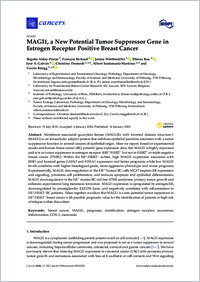Magi1, a new potential tumor suppressor gene in estrogen receptor positive breast cancer
- Alday-Parejo, Begoña Laboratory of Experimental and Translational Oncology, Pathology, Department of Oncology, Microbiology and Immunology, Faculty of Sciences and Medicine, University of Fribourg, 1700 Fribourg, Switzerland
- Richard, François Laboratory for Translational Breast Cancer Research, KU Leuven, 3001 Leuven, Belgium
- Wörthmüller, Janine Laboratory of Experimental and Translational Oncology, Pathology, Department of Oncology, Microbiology and Immunology, Faculty of Sciences and Medicine, University of Fribourg, 1700 Fribourg, Switzerland
- Rau, Tilman Institute of Pathology, University of Bern, 3008 Bern, Switzerland
- Galván, José A. Institute of Pathology, University of Bern, 3008 Bern, Switzerland
- Desmedt, Christine Laboratory for Translational Breast Cancer Research, KU Leuven, 3001 Leuven, Belgium
- Santamaria-Martinez, Albert Tumor Ecology Laboratory, Pathology, Department of Oncology, Microbiology and Immunology, Faculty of Science and Medicine, University of Fribourg, 1700 Fribourg, Switzerland
- Rüegg, Curzio Laboratory of Experimental and Translational Oncology, Pathology, Department of Oncology, Microbiology and Immunology, Faculty of Sciences and Medicine, University of Fribourg, 1700 Fribourg, Switzerland
-
16.01.2020
Published in:
- Cancers. - 2020, vol. 12, no. 1, p. 223
English
Membrane-associated guanylate kinase (MAGUK) with inverted domain structure-1 (MAGI1) is an intracellular adaptor protein that stabilizes epithelial junctions consistent with a tumor suppressive function in several cancers of epithelial origin. Here we report, based on experimental results and human breast cancer (BC) patients’ gene expression data, that MAGI1 is highly expressed and acts as tumor suppressor in estrogen receptor (ER)+/HER2− but not in HER2+ or triple negative breast cancer (TNBC). Within the ER+/HER2− subset, high MAGI1 expression associates with ESR1 and luminal genes GATA3 and FOXA1 expression and better prognosis, while low MAGI1 levels correlates with higher histological grade, more aggressive phenotype and worse prognosis. Experimentally, MAGI1 downregulation in the ER+ human BC cells MCF7 impairs ER expression and signaling, promotes cell proliferation, and reduces apoptosis and epithelial differentiation. MAGI1 downregulation in the ER+ murine BC cell line 67NR accelerates primary tumor growth and enhances experimental lung metastasis formation. MAGI1 expression is upregulated by estrogen/ER, downregulated by prostaglandin E2/COX-2axis, and negatively correlates with inflammation in ER+/HER2− BC patients. Taken together, we show that MAGI1 is a new potential tumor suppressor in ER+/HER2− breast cancer with possible prognostic value for the identification of patients at high- risk of relapse within this subset.
- Faculty
- Faculté des sciences et de médecine
- Department
- Médecine 3ème année
- Language
-
- English
- Classification
- Biological sciences
- License
-
License undefined
- Identifiers
-
- RERO DOC 328489
- DOI 10.3390/cancers12010223
- Persistent URL
- https://folia.unifr.ch/unifr/documents/308546
Statistics
Document views: 143
File downloads:
- pdf: 254
